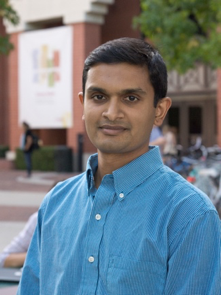News | METRANS Researcher Ketan Savla Receives National Science Foundation Award
Stop the VideoNews

METRANS UTC
METRANS Researcher Ketan Savla Receives National Science Foundation Award
Saturday, August 13, 2016
by By Nicole Guo, MSCE 2017
 Ketan Savla, Professor at USC’s Viterbi School of Engineering, recently received a 2016 Civil, Mechanical and Manufacturing Innovation (CMMI) award from the National Science Foundation (NSF) to fund his research proposal, From Microscopic to Macroscopic Traffic Flow: A Queuing Theoretic Approach. This research project applies queuing theory to control traffic flow, shifting attention from interaction of individual vehicles to overall traffic flow, providing a new vision ranging from microscopic to macroscopic models.
Ketan Savla, Professor at USC’s Viterbi School of Engineering, recently received a 2016 Civil, Mechanical and Manufacturing Innovation (CMMI) award from the National Science Foundation (NSF) to fund his research proposal, From Microscopic to Macroscopic Traffic Flow: A Queuing Theoretic Approach. This research project applies queuing theory to control traffic flow, shifting attention from interaction of individual vehicles to overall traffic flow, providing a new vision ranging from microscopic to macroscopic models.
“The most exciting part is that I view this award as the trust of my peers in the research community in my vision of using previous research experience to tackle this problem” said Savla. “This grant signifies their appreciation and provides me resources to be able to explore the topic in depth, and provides funds for 1-2 Ph.D. students to assist on this project.”
The CMMI Division is one of the four divisions within the Directorate for Engineering at the National Science Foundation. Its mission is to fund fundamental research and education in support of the Foundation’s strategic goals directed at advances in the disciplines of civil, mechanical, industrial and manufacturing engineering, and materials design. Professor Savla’s project, “From Microscopic to Macroscopic Traffic Flow: A Queuing Theoretic Approach,” has the potential to make major advances in improving traffic flow efficiency and reducing traffic congestion.
Over the last few years, Professor Savla had focused on control of transportation systems, including dynamic signal control, routing, ramp metering, and variable speed limit. He views traffic flow as fluid stream in the macroscopic framework. Inspired by connected vehicles and automated vehicles, Professor Savla wanted to explore more granular ways of controlling traffic flow.
The best analog to his project is found in statistical mechanics, which approximate complex interactions between atoms and molecules with a few macroscopic quantities such as temperature and energy state. He was curious whether a similar framework could be developed for traffic flow, with interactions between vehicles neither merely between “nearest neighbors” nor memoryless and controllable.
The project is a gradual process. One challenge Savla’s team encounters now is how to connect microscopic controlled features (i.e. car following, lane changing, and route selection under personalized information) to macroscopic quality of service metrics (i.e. peak capacity, travel times, and energy consumption).
Speaking more specifically about his plans for the project, Savla added, “I want to significantly expand microscopic traffic queue models and their analyses beyond conventional point queue models, translating the analysis into a user interface for a specified automated traffic system and contributing to the next generation of meso- and macroscopic traffic simulators for connected and automated vehicles. In the context of Los Angeles, I would love to develop case studies, and to provide a cost-benefit analysis of the emerging technologies. Also I plan to engage undergraduates in the software development aspect of the project,” Savla explained. The findings of Savla’s project may soon be reflected in new transportation curriculum that might emerge in response to connected and automated vehicle technologies.
Professor Ketan Savla is an assistant professor in the Sonny Astani Department of Civil and Environmental Engineering, with courtesy appointments in Daniel J. Epstein Department of Industrial and Systems Engineering and the Ming Hsieh Department of Electrical Engineering, Viterbi School of Engineering at the University of Southern California. Before joining USC, he was a research scientist in the Laboratory for Information and Decision Systems at MIT. He received his Ph.D. from the University of California, Santa Barbara. His current research interests are in distributed control and estimation of dynamical networks, state-dependent queuing systems, multi-agent systems, and robotics.
(Photo by Ketan Savla)
Nicole Guo
Nicole (Haichao) Guo is a first-year graduate student majoring in transportation engineering at the University of Southern California. Her interests are Intelligent Transportation Systems, High-Speed Rail, and active transportation. She is also an active student member of WTS-Los Angeles, where she volunteers regularly. She can be reached at [email protected].
News Archive
- December (1)
- November (6)
- October (4)
- September (2)
- August (3)
- July (4)
- June (3)
- May (7)
- April (8)
- March (11)
- February (8)
- January (7)
- December (7)
- November (8)
- October (11)
- September (11)
- August (4)
- July (10)
- June (9)
- May (2)
- April (12)
- March (8)
- February (7)
- January (11)
- December (11)
- November (5)
- October (16)
- September (7)
- August (5)
- July (13)
- June (5)
- May (5)
- April (7)
- March (5)
- February (3)
- January (4)
- December (4)
- November (5)
- October (5)
- September (4)
- August (4)
- July (6)
- June (8)
- May (4)
- April (6)
- March (6)
- February (7)
- January (7)
- December (8)
- November (8)
- October (8)
- September (15)
- August (5)
- July (6)
- June (7)
- May (5)
- April (8)
- March (7)
- February (10)
- January (12)















